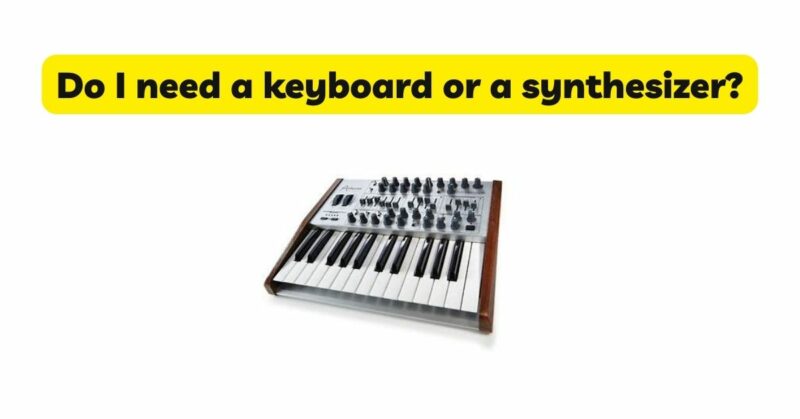When it comes to exploring the world of electronic music or adding keyboard sounds to your compositions, choosing between a keyboard and a synthesizer can be a daunting task. While both instruments offer unique capabilities and features, it is essential to understand your specific needs, musical goals, and desired sound palette. In this article, we will delve into the factors to consider when deciding between a keyboard and a synthesizer, including sound versatility, performance features, user interface, learning curve, and budget. By examining these aspects, we hope to assist you in making an informed choice that suits your musical aspirations.
- Sound Versatility and Sonic Exploration:
Sound versatility is a crucial consideration when selecting an instrument. Keyboards typically offer a wide range of pre-programmed sounds, including various pianos, organs, strings, and more. They are designed to provide a diverse sound palette suitable for different musical genres. Keyboards often incorporate sound libraries and effects, allowing you to experiment and explore various sonic possibilities within a single instrument.
Synthesizers, on the other hand, excel in sound design and sonic manipulation. They offer a vast range of synthesis techniques, allowing you to create and shape unique sounds from scratch. Synthesizers provide access to classic analog tones, modern digital timbres, and experimental textures. If you have a penchant for creating your own sounds, delving into synthesis, or exploring electronic music genres, a synthesizer may be the ideal choice.
- Performance Features and Live Playing:
If your focus is on live performances, the availability of performance features becomes crucial. Keyboards often offer built-in accompaniment styles, rhythm patterns, and backing tracks that can enhance your live playing experience. These features are particularly useful for solo performers or those looking to add depth and complexity to their performances.
Synthesizers, depending on the model, offer performance-oriented features such as arpeggiators, sequencers, and real-time control options. These features enable dynamic live performances, allowing you to create intricate melodies, rhythmic patterns, and improvisations on the fly. Synthesizers are especially favored by electronic music performers and those seeking to engage in live improvisation.
- User Interface and Ease of Use:
The user interface and ease of use can significantly impact your overall experience with the instrument. Keyboards typically feature an intuitive layout, often resembling a traditional piano with a range of buttons and sliders for sound selection and adjustment. This simplicity makes keyboards user-friendly, particularly for beginners or those seeking a straightforward approach to playing and sound selection.
Synthesizers, however, offer a more complex user interface due to their extensive sound design capabilities. They often feature a multitude of knobs, sliders, and parameters that allow you to shape and modify sounds to your liking. While this complexity may require a learning curve, it provides you with unparalleled control and customization options over your sound. If you enjoy experimenting with sound design and have a curiosity for exploring different parameters, a synthesizer may suit you.
- Learning Curve and Technical Understanding:
The learning curve and technical understanding required to operate an instrument are important considerations, particularly for beginners. Keyboards are generally more accessible in terms of learning and playing. They are designed to emulate the feel and sound of traditional pianos, making them ideal for those interested in learning piano technique or incorporating piano-like sounds into their music. With keyboard lessons and resources widely available, learning to play a keyboard can be a straightforward and structured process.
Synthesizers, on the other hand, often demand a deeper understanding of synthesis principles, sound manipulation techniques, and signal flow. Learning to operate a synthesizer requires exploring various synthesis methods, understanding oscillator, filter, and envelope functions, and grasping the concept of modulation. If you are willing to invest time and effort into learning the technical aspects of synthesis, a synthesizer can provide you with endless creative possibilities.
- Budget Considerations:
Budget is an essential factor to consider when choosing an instrument. Keyboards generally offer a range of options to fit various budgets. Entry-level keyboards are often more affordable, making them accessible to beginners or those on a tight budget. However, higher-end keyboards with advanced features and superior sound quality may be more expensive.
Synthesizers, depending on the model and brand, can vary significantly in price. Entry-level synthesizers are available at more affordable price points, allowing beginners to explore sound synthesis without breaking the bank. However, professional-grade synthesizers with advanced sound design capabilities and extensive performance features can be quite expensive. It is essential to set a realistic budget and consider your long-term musical goals before making a purchase.
Conclusion:
Choosing between a keyboard and a synthesizer ultimately depends on your specific needs, musical goals, and desired sound palette. Keyboards offer versatility, ease of use, and access to a wide range of pre-programmed sounds suitable for various genres. They are particularly ideal for those interested in learning piano technique or incorporating traditional keyboard sounds into their music.
Synthesizers provide unparalleled sound design capabilities, sonic exploration, and potential for creativity. They are favored by those interested in electronic music, sound manipulation, and pushing the boundaries of sonic possibilities. While synthesizers may require a steeper learning curve and a deeper understanding of sound synthesis, they offer endless potential for creating unique and innovative sounds.
Consider factors such as sound versatility, performance features, user interface, learning curve, and budget when making your decision. It is also beneficial to try out different instruments, consult with experienced musicians or music educators, and consider your long-term musical aspirations. By doing so, you can choose the instrument that best suits your musical journey and inspires your creativity.


